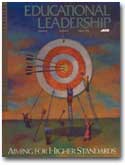John Dewey advised us to avoid the trap of “either-or” thinking, and I take this advice very seriously. Although I am certainly no fan of the standards movement, its advocates have some truth on their side. In particular, we need to get much clearer about just what we are trying to accomplish in public education and just what would constitute success. On this general point, then, I agree with Matthew Gandal. I also agree that we ought not turn public education over to the “whim of the market.” Here is where our agreement ends.
The Wrong Solution
Gandal himself abandons the process of negotiating shared ideals, though for different reasons than those who would abandon it to market-driven choice. In the face of significant controversy about what the curriculum should include—controversy strongly rooted in legitimate concerns about race, class, and gender bias—Gandal advocates including only what he calls “academic” content. Accordingly, he reasons that the traditional disciplines are to be the only object of standards and assessments.
Where is the negotiation? Gandal relies on “the public outcry” over including “nonacademic” aims in the curriculum (particularly the public reception of OBE) as evidence that his proposal is democratic. Readers must evaluate for themselves the accuracy of Gandal's portrayal of what the public expects of its schools. But even if it is accurate, don't educators have a responsibility to challenge the public when it is headed in the wrong direction? In this connection, why does Gandal see fit to take a swipe at school choice in the face of significant public support for it?
As it turns out, Gandal does not wish to exclude nonacademic aims from schooling altogether—only from the arena of standards and assessment. Moral character, an appreciation for diversity, and the capacity to integrate knowledge are acceptable aims for schools to pursue, he says. Unlike the disciplines, however, they can somehow take care of themselves. I find this highly unlikely, particularly when they must compete with the disciplines for which standards and assessments exist.
In any case, by acknowledging that they should be included, Gandal becomes ensnared in his own logic. According to his thinking, are not rigorous standards necessary to foster learning of the kind we want? Why not start with these aims and let the disciplines take care of themselves? Why not at least add these aims to the disciplinary ones? (This, by the way, is what I take one of the main tenets of OBE to be.) Gandal simply begs these questions.
The Wrong Problem
Recounting the failed reforms of the last decade or so, Gandal then touts “school reform based on rigorous academic standards” as “a more promising idea” that can “turn things around in our schools.” Granted, better standards can contribute to improving education, but it is difficult to see how they can be anything more than a very small piece of effective educational reform. Consider the conditions that Jonathan Kozol documents in Savage Inequalities, in which some children are taught in bathrooms and others must use hand-me-down textbooks. Better educational standards can eliminate low achievement under these conditions no more effectively than better nutritional standards can eliminate hunger under famine conditions. Providing the means of attaining the standards is required in each case.
This kind of observation is one of the major justifications for including “opportunity to learn” standards in proposals like Goals 2000. Such standards are intended to ensure that all students have an adequate opportunity to achieve “content” and “performance” standards. And they are required not only to ensure effectiveness but equity as well. It is unfair to hold students and educators responsible for achieving content and performance standards if they must strive to do so under conditions that render success virtually impossible.
Gandal is completely silent about opportunity to learn standards, and, save passing reference to “exposing” the disadvantaged to a good curriculum, he has nothing to say about the problem they are designed to address. Indeed, AFT President Albert Shanker has been openly dismissive of opportunity to learn standards. Why the AFT would want to take such a position I am not sure. I can only say that it is wholly inadequate from the viewpoint of those who see greater equality as essential to educational reform.
I conclude with a related observation about international benchmarking. Gandal's call for “world-class standards” finds its roots in the crisis rhetoric that has dominated since A Nation at Risk. If a crisis exists (which many educational scholars deny, at least by historical standards), it would be best identified with the vast inequality that currently threatens our democratic aspirations. High-performing U.S. students do well on international comparisons; the largest differences are to be found within U.S. public education. International benchmarking—the overemphasis on standards in general—thus serves to divert attention from the most pressing problem facing public education today: the need to provide a much larger, more diverse population with genuine opportunities to learn.
